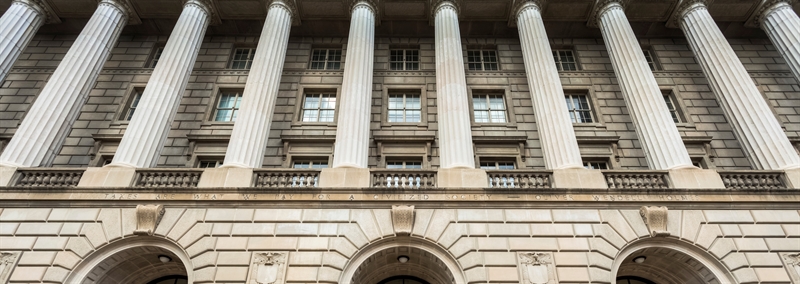Programming Note: Taxation & Representation will return on June 5, after the one-week congressional recess.
Legislative Lowdown
Disaster Relief Tax Bill Passes House: On May 15, Rep. Greg Steube (R-FL) succeeded with a discharge petition for his bill, the Disaster Tax Relief Act (H.R. 5863), advancing the bill to a vote by the House. The bill broadens the definition of a qualified disaster area for the purposes of personal casualty losses and also provides an exclusion from gross income for amounts received as qualified wildfire relief payments. The bill would also provide tax relief for losses related to the February 2023 train derailment in East Palestine, Ohio.
A discharge petition is a seldom-used legislative tool to remove a bill from consideration by the committee of jurisdiction, provided the petition is signed by at least 218 voting members of the House of Representatives. Often, bipartisan support is needed to achieve a successful discharge petition, and more Democrats supported the petition discharging H.R. 5863 than Republicans. In response to the successful effort, Rep. Steube said that “Floridians are long past due for disaster tax relief, and I’m glad to see leadership finally advance this bipartisan bill.” On May 21, the House overwhelmingly passed the bill by a vote of 382-7.
Ways and Means Committee Advances Exempt Organizations, Unlawful Disclosure Bills to House Floor: On May 15, the House Ways and Means Committee marked up four bills intended to increase transparency and reporting standards for tax-exempt organizations and one bill increasing the penalty for the unlawful disclosure of tax return information. The committee reported all five bills favorably.
The four exempt-organization reporting bills were:
- the Foreign Grant Reporting Act (H.R. 8290), introduced by Rep. Lloyd Smucker (R-PA), would impose disclosure requirements on 501(c) organizations that provide grants to foreign entities, consistent with existing standards for grants to domestic entities.
- the End Zuckerbucks Act (H.R. 8291), introduced by Rep. Claudia Tenney (R-NY), would prevent 501(c)(3) organizations from providing direct or indirect funding for the purpose of the administration of U.S. elections, with the exception of donations of space to be used as a polling place.
- the American Donor Privacy and Foreign Funding Transparency Act (H.R. 8293), introduced by Rep. David Schweikert (R-AZ), would strengthen disclosure requirements for tax-exempt organizations receiving contributions from foreign sources, and increases privacy for U.S. donors to tax-exempt organizations.
- the No Foreign Election Interference Act (H.R. 8314), introduced by Rep. Nicole Malliotakis (R-NY), would increase penalties imposed on tax-exempt organizations that make certain disqualified political committee contributions and revoke the tax-exempt status of any 501(c) organization that makes more than two disqualified political committee contributions.
The unlawful disclosure bill, the Taxpayer Data Protection Act (H.R. 8292), was introduced by Chairman Jason Smith (R-MO) and would increase the maximum criminal penalty for the unauthorized disclosure of sensitive tax return information to $250,000 and up to 10 years in prison. The bill also provides that, in the case of an unauthorized disclosure involving the returns or return information of multiple taxpayers, a separate violation occurs with respect to each such taxpayer whose information is disclosed. Chairman Smith introduced this bill in response to the prosecution of Charles Littlejohn, a former Internal Revenue Service (IRS) contractor who was sentenced to five years in prison for leaking tax return information of wealthy filers, including former President Donald Trump, to ProPublica and The New York Times in 2021. Littlejohn was charged with a single count of wrongful disclosure, despite thousands of taxpayers’ return information being compromised in the security breach. The IRS has not identified the exact number of affected taxpayers, but the agency has been notifying taxpayers potentially subject to the disclosure.
Democratic Lawmakers Write Letter Urging Extension of Direct File Pilot Program: Led by Sens. Elizabeth Warren (D-MA) and Tom Carper (D-DE) and Reps. Katie Porter (D-CA) and Brad Sherman (D-CA), over 130 Democratic lawmakers sent a letter to Treasury Secretary Janet Yellen and Internal Revenue Service (IRS) Commissioner Daniel Werfel on May 15, congratulating the agencies for a perceived “resoundingly successful launch” of the Direct File pilot program, which allowed eligible taxpayers in 12 states to file their individual federal tax returns directly with the government. The lawmakers reported that taxpayers using Direct File claimed over $90 million in refunds, saved an estimated $5.6 million in filing fees, and overwhelmingly rated their tax-filing experience as positive. They also called for the IRS and Treasury Department to make the Direct File permanent, and to expand its scope to reach more taxpayers, despite well-established concerns that the IRS may not have the statutory authority to administer a direct tax-filing platform. Improvements to the program that the lawmakers are petitioning the IRS for include additional sources of income, integration with additional states, greater accommodation of tax credits applicable to low- and middle-income families, and the pre-population of tax information onto the platform.
Wyden Warns of Difficulties in 2025 If Senate Cannot Pass Wyden-Smith Tax Package: Speaking at a Tax Council Policy Institute annual conference on May 16, Senate Finance Committee Chairman Ron Wyden (D-OR) stated that if the Tax Relief for American Families and Workers Act (H.R. 7024) fails to advance in the Senate, it would cast a significant shadow on upcoming negotiations for a tax package in 2025 to address the expiration of critical individual tax provisions in the Tax Cuts and Jobs Act (Pub. L. 115-97). Chairman Wyden expressed confidence that a viable path remains for passage of the bill, saying that he is “not going to speculate about failing” and that Senate Republicans would have difficulty opposing the bill if it were brought to the Senate floor. Though Senate Majority Leader Chuck Schumer (D-NY) has not committed to advancing the bill out of concern that it may not have sufficient support, Chairman Wyden said he is “working with [Leader Schumer] to get a time schedule” to bring the bill up for consideration by the Senate. However, there continues to be no indication that Senate Republican opposition to the bill has softened enough to ensure the bill’s passage.

1111 Constitution Avenue
Treasury Department, IRS Issue Additional Guidance for Domestic Content Bonus Credit: On May 16, the Treasury Department and Internal Revenue Service (IRS) issued Notice 2024-41 (“Notice”), providing additional guidance on the domestic-content bonus for the section 45, 48, 45Y, and 48E tax credits. The domestic content bonus credit, created as part of the Inflation Reduction Act (Pub. L. 117-169), provides taxpayers with an up to 10% bonus credit if all steel and iron used in the energy project is domestically produced and not less than the “adjusted percentage”—currently 40%—of the total costs of the project’s manufactured products are mined, produced or manufactured in the United States. Under previous guidance, taxpayers could only take into account the direct costs (excluding labor cost) of each of the project’s manufactured products, information that is challenging to obtain from third-party vendors in many cases.
The Notice implements a new elective safe harbor that allows taxpayers constructing certain energy projects to rely on default cost percentages for manufactured products and components to determine if they qualify for the bonus credit. For electing taxpayers, this method of calculating cost percentages may be applied in lieu of obtaining project-specific cost information from suppliers, which the Notice recognizes “may present challenges for substantiation and verification.” The Notice provides a reference table with the default percentages for applicable projects generally in the areas of wind, solar and battery storage. If a taxpayer constructing one of the applicable projects elects the new safe harbor, it may use these sample cost percentages to determine compliance with the domestic-content requirements. In response to the updated guidance, Senior Adviser to the President for International Climate Policy John Podesta said that the “new safe harbor approach will make it simpler for more companies to take advantage of this powerful incentive and support good-paying American jobs.”
Beyond the new elective safe harbor, the Notice updates previous domestic-content guidance to add more safe harbor classifications, including the addition of hydropower technologies, as well as to provide clarity for ground-mount and rooftop photovoltaic systems. The deadline for public comments is July 15, 2024.

At a Glance
Biden Administration to Announce Policies to Bolster Domestic Solar Manufacturing: The Biden administration released domestic-content bonus guidance (discussed above) and expanded tariffs in an effort to increase demand for domestically produced solar panels and protect U.S. manufacturers from cheaper foreign panel imports entering U.S. markets. With the announcement of the new policies, Senior Adviser to the President for International Climate Policy John Podesta said that the actions are intended to “support U.S. clean energy industries to both make sure we’re doing our part to reduce emissions and to make sure our competition with China is actually fair.”
IRS Establishes Reference Standard for Section 179D Deduction: On May 17, the Internal Revenue Service (IRS) issued Announcement 2024-24, notifying taxpayers that Reference Standard 90.1 is the required standard under Section 179D(c)(2) for energy efficient commercial building property (EECBP) placed in service after Dec. 31, 2028, and the construction of which did not begin by Dec. 31, 2022. The Section 179 deduction for EECBP was expanded as part of the Inflation Reduction Act. The announcement affirms that Reference Standard 90.1-2022, developed by the American Society of Heating, Refrigerating and Air-Conditioning Engineers and the Illuminating Engineering Society of North America, is the applicable standard for the purposes of calculating energy and consumption costs when determining the amount of the 179D deduction for a qualifying building.
Treasury Department, IRS Announces Amount of Unallocated Capacity Limitation Carryover Amounts: On May 17, the Department of the Treasury and Internal Revenue Service (IRS) issued Announcement 2024-25, which details the total amount of unallocated environmental justice solar and wind capacity limitation (Capacity Limitation) for the Section 48(e) Low-Income Communities Bonus Credit Program. The total amount of unallocated capacity limitation from 2023 was assessed to be 324.785 megawatts, which will be added to the 2024 available Capacity Limitation of 1.8 gigawatts to result in just over 2.1 gigawatts to be allocated for the 2024 program year.
IRS Determining How to Maintain Compliance with Audit Pledge: On May 17, Internal Revenue Service (IRS) Deputy Commissioner Douglas O’Donnell said the agency was looking into methods on how to ensure that small businesses earning under $400,000 per year are not subject to increased audits, in line with President Biden’s longstanding pledge. O’Donnell said that implementing this pledge is “more complicated in the small business arena” than expected, and offered a number of possible standards, such as analyzing passthrough taxable income. He also sought to ensure that large businesses reporting zero taxable income through the use of deductions or because of business losses are not necessarily exempt from increased audits.
Bipartisan Lawmakers Introduce CRA Resolution to Repeal EV Tax Credit Rules: On May 16, Sens. Joe Manchin (D-WV) and Deb Fischer (R-NE) and Reps. Carol Miller (R-WV) and Jared Golden (D-ME) introduced a Congressional Review Act (CRA) resolution that would void the regulations implementing the Sections 25E and 30D clean vehicle tax credits, which were initially enacted as part of the Inflation Reduction Act. The lawmakers expressed concern over the credit’s treatment of minerals and materials sourced from China, with Rep. Miller saying the credit’s final regulations “prioritiz[e] misguided Green New Deal products coming from China over American investment in our domestic supply chain,” and Sen. Manchin saying that the Biden administration “continues to ignore the law that Congress agreed upon and implement a bill that they did not pass that allows China to gain control of our nation’s auto industry."
Hearings and Events
House Ways and Means Committee
On May 20, the House Ways and Means Subcommittee on Tax held a field hearing titled “Creating More Opportunity and Prosperity in the American Rust Belt.”
Senate Finance Committee
On May 21, the Senate Finance Committee held a hearing titled “Child Savings Accounts and Other Tax-Advantaged Accounts Benefiting American Children."